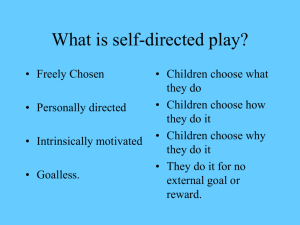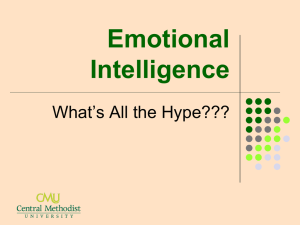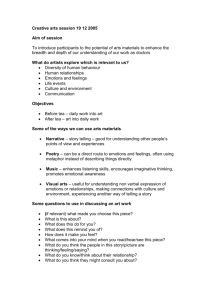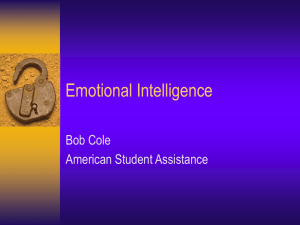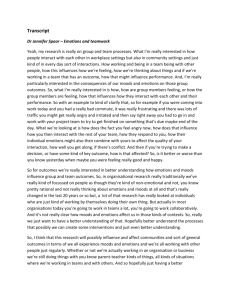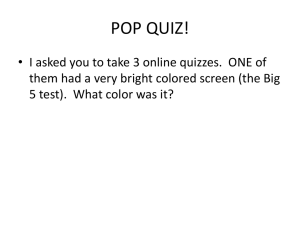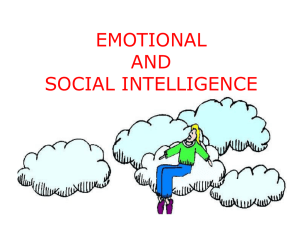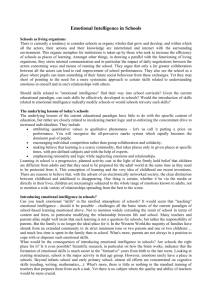Decision making, emotions, and entrepreneurship
advertisement
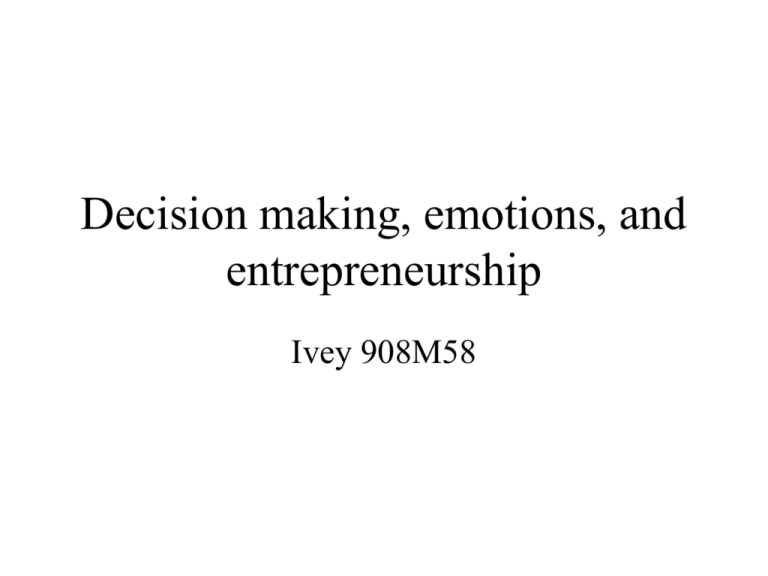
Decision making, emotions, and entrepreneurship Ivey 908M58 Key questions 1. What’s new about emotional intelligence in our understanding of human behavior? 2. Is EI really as “touchy-feely” as it’s been portrayed in popular media? 3. How can you use dimensions of EI? 4. Why have some managers / individuals persisted in discounting emotional intelligence? Emotions and feelings… • • • • • Reduce rationality Contribute to poor decision making Weak Incompetent Inappropriate Decision making > intellect alone • Feelings play a fundamental role in the way we make decisions • Lack of emotion reduces our ability to make good decisions • People with damage in the “emotion” neighborhood of their brains tend to make inappropriate or bad decisions Logic + feelings = good decisions Feelings help us to: • Direct our attention to highly important things • Make choices between competing options • Be flexible, maintain options, and widen our points of view • Be creative and aware of opportunities that surround us Positive v. negative feelings • Positive feelings associated with increased creativity, integrative thinking, inductive reasoning • Negative feelings associated with greater attention to detail, detection of errors, problem solving and detailed information processing Moods and emotions • Are expressions of feelings or “affect” • Moods are low-level, non-specific feeling that we may not even be conscious of • Emotions tend to be sharp, short-lived specific responses to specific events • Moods and emotions are differentiated by their level of energy Describing moods and emotions Mood Positive Negative Emotion Content, serene, Alert, excited, relaxed, calm enthusiastic, elated, happy Sad, Depressed, Tense, nervous, Lethargic, stressed, upset, Fatigued angry How moods affect our decisions • We tend to store information that is consistent with our mood • We tend to recall information that is consistent with our mood • When decision making we tend to selectively remember information that does not provide a balanced assessment of the situation Positive = good, negative = bad, right? • Good moods increase susceptibility to decision making biases like planning fallacy, optimistic bias, greater belief in likelihood of positive outcomes, and lower likelihood of negative outcomes • Negative emotions can refocus a leader’s attention, alert us to focus on issues that we’d otherwise ignore (attention to detail) Emotional intelligence • “The ability to effectively join emotions and reasoning, using emotions to facilitate reasoning and reasoning intelligently about emotions” • EI provides insights into organizational behavior • EI can mitigate decision making biases caused by emotions Importance of EI 1. EI is twice as important as both technical skills and IQ in terms of performance 2. EI is more important at higher levels within an organization, accounting for 90% of difference between average and high performers 3. Teams with critical mass of EI significantly outperform teams without EI critical mass The emotionally intelligent entrepreneur Self-awareness Self-regulation EI Entrepreneur Motivation Empathy Social skill Goleman’s model of emotional intelligence Dimension Definition Hallmarks Self-awareness Ability to recognize and understand your moods, emotions, and drives, as well as their effect on others Self-confidence, realistic selfassessment, selfdeprecating sense of humor Goleman’s model of emotional intelligence Dimension Definition Hallmarks Self-regulation Ability to control or redirect disruptive impulses and moods; to think before acting Trustworthiness, integrity, comfort with ambiguity, openness to change Goleman’s model of emotional intelligence Dimension Definition Hallmarks Motivation Passion for work for reasons that go beyond money or status; propensity to pursue goals with energy & persistence Strong desire to achieve, optimism in the face of failure, organizational commitment Goleman’s model of emotional intelligence Dimension Definition Hallmarks Empathy Ability to understand emotional makeup of others; skill in treating people according to their emotional reactions Expertise in building and retaining talent, cross-cultural sensitivity, service to clients and customers Goleman’s model of emotional intelligence Dimension Definition Hallmarks Social skill Proficiency in managing relationships and building networks, ability to find common ground & build rapport Effectiveness in leading change, persuasiveness, expertise in building and leading teams Hallmarks of EI entrepreneur Self-awareness Self-regulation Self-confidence, realistic selfassessment, self-deprecating sense of humor Trustworthy, open to change Motivation Achievers, optimists, committed Empathy Building & retaining talent, service Social skill Change leaders, persuasive, team builders
